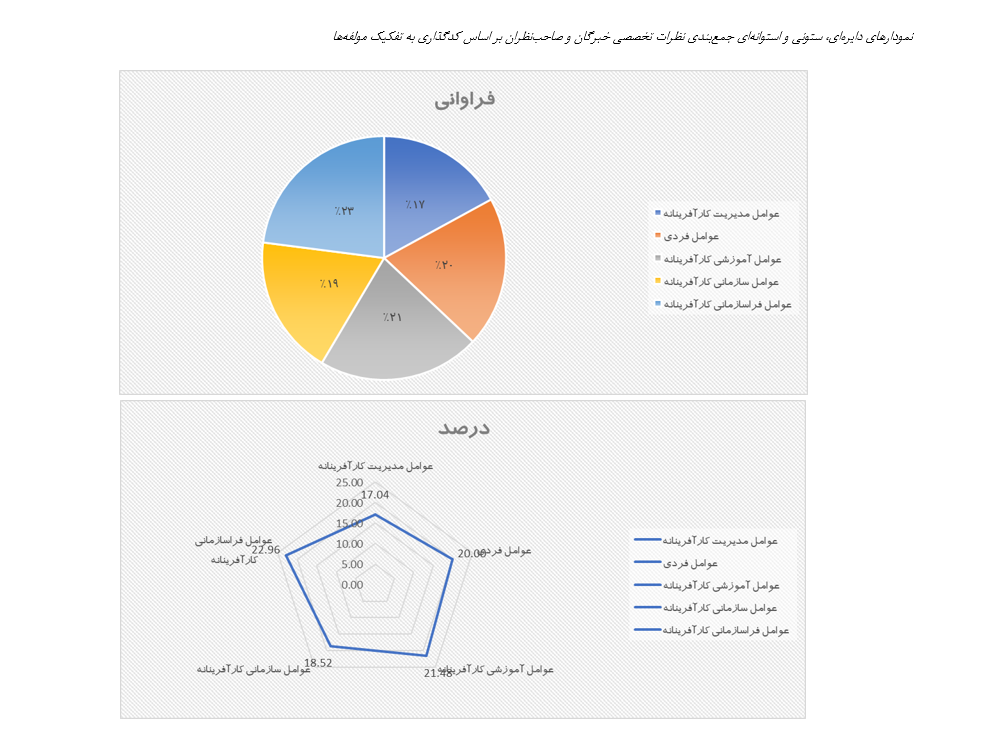طراحی الگوی یادگیری کارآفرینانه در آموزش ابتدایی
کلمات کلیدی:
یادگیری کارآفرینانه, آموزش ابتدایی, عوامل مدیریت کارآفرینانهچکیده
پژوهش حاضر ارائه مدل یادگیری کارآفرینانه در آموزش ابتدایی است. روش این پژوهش از نظر هدف کاربردی است و به روش اکتشافی انجام شده است. نحوه گردآوری دادهها به روش آمیخته (کمی و کیفی) صورت گرفته است و ابزار گرد آوری دادهها مصاحبه با خبرگان با انجام مصاحبههای تخصصی به روش دلفی، و پرسشنامه میباشد. پس از طریق اجرای پرسشنامه، تحلیل دادهها در بخش کیفی به روش کدگذاری (باز، محوری و انتخابی) و در بخش کمی تجزیه و تحلیل دادههای جمع آوری شده، به دو روش توصیفی و استنباطی از طریق نرم افزار SPSS 16 و Smart PLS انجام شد. در این پژوهش برای توصیف دادهها از آمار توصیفی شامل فراوانی، درصد فراوانی، جدول توزیع فراوانی، ترسیم نمودارها و همچنین توصیف ویژگیهای پاسخ دهندگان به پرسشنامه استفاده گردید. و در تحلیل استنباطی به روش تحلیل عاملی، به تجزیه و تحلیل دادهها پرداخته شد. نتایج نشان داد: مولفه عوامل آموزشی کارآفرینانه، مولفه عوامل سازمانی کارآفرینانه، مولفه عوامل فراسازمانی کارآفرینانه، مولفه عوامل فردی، و در نهایت مولفه عوامل مدیریت کارآفرینانه؛ به دلیل آنکه هیچ یک از مولفهها بار عاملی کمتر از ۰٫۳ نداشت، از روند تحلیل عاملی حذف نگردیدند و در نهایت هر 5 مولفه، با شاخصهای آن ها، تحت عنوان ابعاد و مولفههای مدل یادگیری کارآفرینانه در آموزش ابتدایی مورد پذیرش قرار گرفت. شاخصهای برازش الگو در تحلیل عاملی، برازش الگو را تأیید مینمایند.
دانلودها
مراجع
Abzari, M., & Yazdanshenas, M. (2016). Social Responsibility and Work Ethics in Modern Quality Management.
Management Culture Quarterly, 5(15), 5-42. https://jomc.ut.ac.ir/article_19357.html?lang=en
Ardalan, M. R., Soltanzadeh, V., & Beheshti Rad, R. (2014). Evaluating the Role of Organizational Culture in
Organizational Entrepreneurship. Higher Education Letter, 6(23), 68-79.
https://journal.sanjesh.org/article_14864.html
Budur, T., Demirer, H., & Rashid, C. A. (2024). The effects of knowledge sharing on innovative behaviours of
academicians; mediating effect of innovative organization culture and quality of work life. Journal of Applied
Research in Higher Education, 16(2), 405-426. https://doi.org/10.1108/JARHE-08-2022-0257
Ebrahimpour, H. (2013). The Impact of Functional Performance on Work Ethics (Case Study: Staff of Mohaghegh
Ardabili University). Journal of General Management Research(19), 83-101.
https://jmr.usb.ac.ir/article_1260.html?lang=en
Erabi, S. M. (2013). Explaining the Factors for Entrepreneurs' Success and Presenting a Suitable Model of Success
Factors in Iran's Market. Collection of Discussions and Articles of the First Congress on Entrepreneurship in the
Health Sector,
Givarian, H. (2015). The Role Levels of Ethic on Organizational Decisions. Journal of Tadbir(162).
https://ensani.ir/fa/article/149499/
Hollingsworth, C., Brewer, E. K., & Petty, C. G. (2012). Work Ethic of Extension Educators.
Nazari Ardabili, S. Z., Benisi, P., & Vatankhah, H. (2024). Designing the Maturity Management Model of Educational
Technology in Iranian Schools. Sociology of Education, 10(1), 314-326.
https://doi.org/10.22034/ijes.2024.2022649.1536
Nguyen, M., Sharma, P., & Malik, A. (2024). Leadership styles and employee creativity: the interactive impact of online
knowledge sharing and organizational innovation. Journal of Knowledge Management, 28(3), 631-650.
https://doi.org/10.1108/JKM-01-2023-0014
Salman Al-Oda, A. H., Sadeghi, M., Al-Murshidi, R. H. A., & Sharifi, S. (2024). Investigating the Relationship Between
Talent Management Implementation Categories in the Basra Province Education Organization [Research Article].
Iranian Journal of Educational Sociology, 7(1), 1-9. https://doi.org/10.61838/kman.ijes.7.1.1
Shekh-Abed, A. (2024). Metacognitive self-knowledge and cognitive skills in project-based learning of high school
electronics students. European Journal of Engineering Education, 1-16.
https://doi.org/10.1080/03043797.2024.2374479
Song, H., & Cai, L. (2024). Interactive learning environment as a source of critical thinking skills for college students.
BMC Medical Education, 24(1), 1-9. https://doi.org/10.1186/s12909-024-05247-y
Steinberg, O., Kulakow, S., & Raufelder, D. (2024). Academic self-concept, achievement, and goal orientations in
different learning environments. European Journal of Psychology of Education, 1-25.
https://doi.org/10.1007/s10212-024-00825-6
Tamaddoni, A., & Hoseinkhlezadeh, R. (2024). Identifying the challenges and issues faced by school managers in Iran
compared to global experiences. Journal of New Approaches in Educational Management, 14(5), 20-33.
https://jedu.marvdasht.iau.ir/article_6162.html
Vuorio, J. (2024). Studying the Use of Virtual Reality Learning Environments to Engage School Children in Safe Cycling
Education. Simulation & Gaming, 55(3), 418-441. https://doi.org/10.1177/10468781241246566
Wang, J., Sheng, M., & Song, R. (2024). Enhancing Classroom Behaviors and Creativity: The Impact of a Critical
Thinking Workshop. International Journal of Education and Cognitive Sciences, 5(1), 8-15.
https://doi.org/10.61838/kman.ijecs.5.1.6
Xiu-Juan, F., Xiao-Hui, C., Huan, L., & Xiang-Xiang, L. (2024). Serial multiple mediation of psychological capital and
self-directed learning ability in the relationship between perceived stress and professional identity among
undergraduate nursing students in China: a cross-sectional questionnaire survey. BMC Medical Education, 24, 1450.
https://doi.org/10.1186/s12909-024-06459-y
Yim, I. H. Y. (2024). Artificial Intelligence (AI) Learning Tools in K-12 Education: A scoping Review. Journal of
Computers in Education. https://doi.org/10.1007/s40692-023-00304-9
Yuan, A., & Chayanuvat, A. (2022). A Learning Organization: Conditions for Success of the Excellent Schools in Hunan,
China. Asia Social Issues, 15(5), 252762. https://doi.org/10.48048/asi.2022.252762
Zhang, Y. (2024). Mechanisms of the Impact of Enterprise Digital Transformation on Knowledge Sharing Behavior of
Employees. 1(3), 309-318. https://doi.org/10.62517/jmsd.202412343

دانلود
چاپ شده
ارسال
بازنگری
پذیرش
شماره
نوع مقاله
مجوز
حق نشر 2025 تکنولوژی در کارآفرینی و مدیریت استراتژیک

این پروژه تحت مجوز بین المللی Creative Commons Attribution-NonCommercial 4.0 می باشد.










